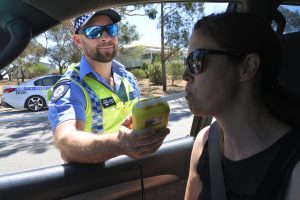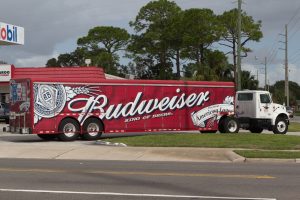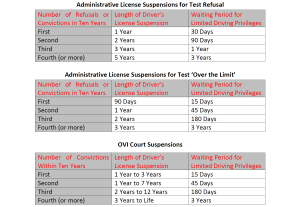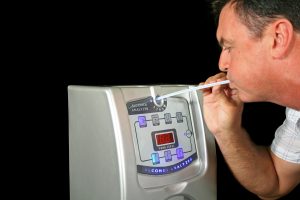 The Ontario Provincial Police (OPP) recently implemented a policy of administering a breath alcohol test to every driver stopped for a traffic offense. Even if the stop is for a minor violation, and even if the officer has no suspicion the driver is under the influence, the driver must submit to a breath test. Refusing the test is a criminal offense. Could this happen in Ohio?
The Ontario Provincial Police (OPP) recently implemented a policy of administering a breath alcohol test to every driver stopped for a traffic offense. Even if the stop is for a minor violation, and even if the officer has no suspicion the driver is under the influence, the driver must submit to a breath test. Refusing the test is a criminal offense. Could this happen in Ohio?
Articles Tagged with OMVI
Brush Your Teeth…and Measure Your Alcohol Level
 You probably have heard of the Breathalyzer, but probably not the Brushalyser. Now you have. The Brushalyser is at the intersection of oral hygiene and traffic safety: it’s a toothbrush which doubles as a portable breath alcohol test. But should you rely on your toothbrush to determine whether it’s safe for you to drive?
You probably have heard of the Breathalyzer, but probably not the Brushalyser. Now you have. The Brushalyser is at the intersection of oral hygiene and traffic safety: it’s a toothbrush which doubles as a portable breath alcohol test. But should you rely on your toothbrush to determine whether it’s safe for you to drive?
Hypoglycemia and DUI / OVI in Ohio
 There are situations in which a law enforcement officer observes signs which appear to be symptoms of alcohol intoxication but are actually symptoms of a medical condition. One of those situations is when a driver is experiencing hypoglycemia (low blood sugar). The symptoms of hypoglycemia are nearly identical to the symptoms of alcohol intoxication. A driver experiencing a hypoglycemic event at the time of an OVI investigation has a legitimate defense to the charge of DUI (called ‘OVI’ in Ohio).
There are situations in which a law enforcement officer observes signs which appear to be symptoms of alcohol intoxication but are actually symptoms of a medical condition. One of those situations is when a driver is experiencing hypoglycemia (low blood sugar). The symptoms of hypoglycemia are nearly identical to the symptoms of alcohol intoxication. A driver experiencing a hypoglycemic event at the time of an OVI investigation has a legitimate defense to the charge of DUI (called ‘OVI’ in Ohio).
Commercial Drivers and DUI / OVI in Ohio
 A truck driver hauling 43,000 pounds of beer was charged with DUI (called ‘OVI’ in Ohio). According to KRCR TV, the driver’s blood alcohol content was ‘over the limit’ for both commercial drivers and non-commercial drivers. While the irony of a beer deliverer being charged with DUI may sound comical, a commercial driver would find nothing funny about being charged with OVI. For holders of a commercial driver’s license (CDL), the rules related to OVI are strict, and the consequences are severe.
A truck driver hauling 43,000 pounds of beer was charged with DUI (called ‘OVI’ in Ohio). According to KRCR TV, the driver’s blood alcohol content was ‘over the limit’ for both commercial drivers and non-commercial drivers. While the irony of a beer deliverer being charged with DUI may sound comical, a commercial driver would find nothing funny about being charged with OVI. For holders of a commercial driver’s license (CDL), the rules related to OVI are strict, and the consequences are severe.
Gen Z is Last Alphabetically but First for Bad Driving
 A recent study by Lending Tree addressed the generational differences in bad driving. The study analyzed the rates of driving incidents in four categories among five generations: Generation Z, Millennials, Generation X, Baby Boomers, and the Silent Generation. The study report explains Generation Z has the worst rates among all generations for all categories.
A recent study by Lending Tree addressed the generational differences in bad driving. The study analyzed the rates of driving incidents in four categories among five generations: Generation Z, Millennials, Generation X, Baby Boomers, and the Silent Generation. The study report explains Generation Z has the worst rates among all generations for all categories.
Driving Privileges for DUI/ OVI in Ohio
 I came across an article about a pending bill in South Dakota which proposes expanding the scope of driving privileges for people convicted of DUI (called ‘OVI in Ohio). It reminded me that, in Ohio, driving privileges related to OVI are often misunderstood. This article clarifies Ohio law regarding limited driving privileges and describes how driving privileges work in practice.
I came across an article about a pending bill in South Dakota which proposes expanding the scope of driving privileges for people convicted of DUI (called ‘OVI in Ohio). It reminded me that, in Ohio, driving privileges related to OVI are often misunderstood. This article clarifies Ohio law regarding limited driving privileges and describes how driving privileges work in practice.
DUI/OVI and Improperly Handling Firearms in Ohio
 Muhammad Wilkerson, former defensive end for the New York Jets, was arrested for Operating a Vehicle under the Influence and Unlawful Possession of a Loaded handgun. Wilkerson’s arrest occurred in New Jersey. If Wilkerson were arrested for these offenses in Ohio, he would be charged with OVI and Improperly Handling Firearms in a Motor Vehicle. This article describes the elements, court process, and potential penalties for these offenses in Ohio.
Muhammad Wilkerson, former defensive end for the New York Jets, was arrested for Operating a Vehicle under the Influence and Unlawful Possession of a Loaded handgun. Wilkerson’s arrest occurred in New Jersey. If Wilkerson were arrested for these offenses in Ohio, he would be charged with OVI and Improperly Handling Firearms in a Motor Vehicle. This article describes the elements, court process, and potential penalties for these offenses in Ohio.
Ohio DUI / OVI Enforcement Increased for 2023 Winter Holidays
 Christmas and New Year’s Eve are the most-celebrated holidays in the United States. During the winter holiday season, people attend more work parties, family functions, and other social events than any other time of the year. After attending those events, people need a way to get home. Most of them drive, and some of them drive under the influence. The government knows this, so DUI (called ‘OVI’ in Ohio) enforcement is intensified during this time of the year.
Christmas and New Year’s Eve are the most-celebrated holidays in the United States. During the winter holiday season, people attend more work parties, family functions, and other social events than any other time of the year. After attending those events, people need a way to get home. Most of them drive, and some of them drive under the influence. The government knows this, so DUI (called ‘OVI’ in Ohio) enforcement is intensified during this time of the year.
Some Allegations of Breath Test Refusals Are Unfair
 Ohio’s DUI laws (called ‘OVI’ in Ohio) criminalize driving with a prohibited breath alcohol concentration. To determine whether a person has a prohibited breath alcohol concentration, law enforcement officers use breath-testing machines. If a person refuses a breath test, there are consequences. However, differences in height, age, gender, and smoking habits make some people physically unable to provide a sufficient breath sample. As a result, some people are accused of refusing a breath test when they didn’t.
Ohio’s DUI laws (called ‘OVI’ in Ohio) criminalize driving with a prohibited breath alcohol concentration. To determine whether a person has a prohibited breath alcohol concentration, law enforcement officers use breath-testing machines. If a person refuses a breath test, there are consequences. However, differences in height, age, gender, and smoking habits make some people physically unable to provide a sufficient breath sample. As a result, some people are accused of refusing a breath test when they didn’t.
Driving School Tests Skills of Drunk Drivers
 The Chikushino Police Department has a program in which driving instructors test the driving skills of volunteers who are under the influence of alcohol. According to a CNN article, testing impaired drivers is part of a drunk driving awareness campaign. In Ohio, we do not use drunk driving exams to determine if drivers are impaired by alcohol or drugs. Instead, we use field sobriety tests and blood/breath/urine tests. Those tests are circumstantial evidence that a person was operating a vehicle under the influence.
The Chikushino Police Department has a program in which driving instructors test the driving skills of volunteers who are under the influence of alcohol. According to a CNN article, testing impaired drivers is part of a drunk driving awareness campaign. In Ohio, we do not use drunk driving exams to determine if drivers are impaired by alcohol or drugs. Instead, we use field sobriety tests and blood/breath/urine tests. Those tests are circumstantial evidence that a person was operating a vehicle under the influence.
 Columbus OVI/DUI Attorney Blog
Columbus OVI/DUI Attorney Blog

